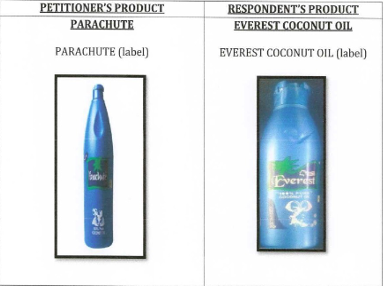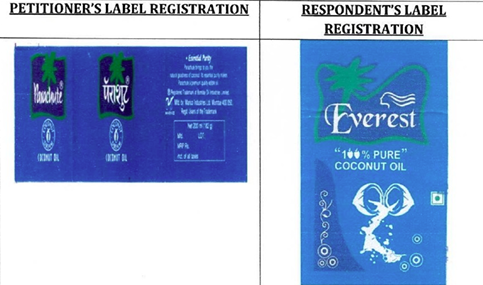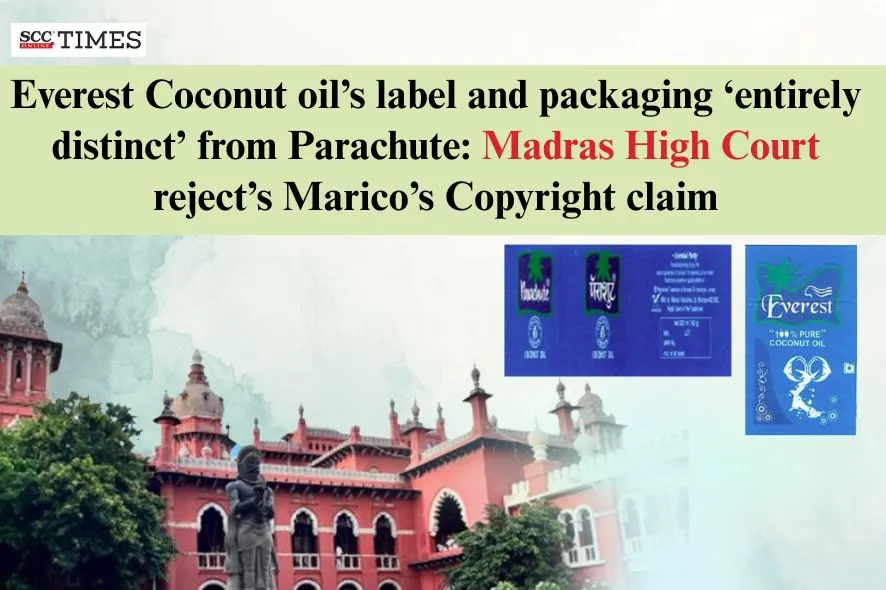Madras High Court: While hearing a petition seeking suspension and removal of the respondent’s copyright registration, filed by Marico Ltd., manufacturer of well-known products including PARACHUTE, a Single Judge Bench of N. Senthilkumar, J., held that the petitioner’s claim of similarity between the respondent’s product and its own was wholly untenable. The Court held that the respondent’s trade dress was ‘clearly distinguishable’ from the petitioner’s and that the petitioner did not produce supporting materials to establish infringement.
The Court further observed that,
“The use of blue colour in the packaging of hair oils is common in the trade and cannot be claimed exclusively by any single manufacturer.”
Background:
The petitioner, a company incorporated in 1988 under the Companies Act, 1956, is engaged in the manufacture and sale of several well-known consumer products, including PARACHUTE, PARACHUTE ADVANSED JASMINE, Marico’s HAIR & CARE, NIHAR, SAFFOLA, MEDIKER, LIVON, REVIVE, SILK N SHINE, and SET WET.
However, a petition was filed under Section 50 of the Copyright Act, 1957 (‘Copyright Act’), seeking removal or rectification of Copyright Registration dated 01-06-2009, which was granted in favour of the respondent for the artistic work used on the packaging of EVEREST COCONUT OIL.
The petitioner contended that the registration was wrongly granted and fraudulently continued to remain on the Register of Copyrights. It was alleged that the respondent’s label was a substantial, colourable imitation and copy of the petitioner’s prior copyrighted and trademarked PARACHUTE label. The petitioner’s label was distinctive, featuring the Flag Device, the Broken Coconut Device, the unique blue and green colour combination, and the overall layout and trade dress that became exclusively associated with the petitioner’s products.
The petitioner further alleged that it held prior copyright registration and multiple trademark registrations, all of which predated the respondent’s registration. The petitioner and its predecessors, Bombay Oil Industries Ltd., used the PARACHUTE label extensively and continuously since 1948. It was argued that the respondent obtained registration by concealing material facts and misrepresenting the originality of his work, thereby violating Section 45(1) of the Copyright Act. The respondent also failed to disclose the existence of the petitioner’s prior trademark registrations for deceptively similar artistic works.
According to the petitioner, the respondent’s conduct amounted to copyright infringement, passing off, and unfair competition, as the label replicated essential features of the PARACHUTE label and misled the public into believing that the respondent’s product originated from or was associated with the petitioner. The petitioner also pointed to the respondent’s history of infringing behaviour, noting that he previously copied the PARACHUTE trade dress in 2002 under the mark SHRI LAXMI. Despite cease-and-desist notices and court proceedings, the respondent continued unlawful imitation.
It was also argued that the registration violated principles of equity, fair play, and justice, and undermines the legislative intent of protecting only original artistic works under Section 13(1)(a) of the Copyright Act. Since the Respondent’s work was a pirated reproduction and not an original creation, the registration was wrongly entered in the Copyright Register.
The petitioner therefore prayed for suspension and expungement of the impugned Copyright Registration. Accordingly, by order dated 14-08-2025, the respondent was set ex parte.
Analysis and Decision:
The Court emphasised that the primary contention of the petitioner was that the respondent’s product was deceptively similar to that of the petitioner and that the colour, coconut tree description, broken coconut, and design were all registered marks of the petitioner.
The Court noted that the petitioner issued a cease-and-desist notice dated 17-06-2016 to the respondent, alleging infringement of the petitioner’s copyright. The Court further observed that the respondent issued a response dated 04-07-2016, wherein the respondent denied all allegations of infringement, characterised the petitioner’s claims as unfounded, and asserted their lawful right to continue using their registered marks.
The Court highlighted that the petitioner also claimed that their label was used by the respondent, which was a substantial reproduction of the petitioner’s work.
Comparison of the petitioner’s and the respondent’s products


The Court observed that the point for consideration was whether the respondent infringed the copyright of the petitioner. The Court emphasised that there was no dispute about the fact that the petitioner’s product name, colour, and design are registered ones. It was further noted that it was evident that the respondent’s product mark was also a registered device mark, and its colour was duly approved by the Registrar. Therefore, the Court held that the petitioner’s allegation of infringement by the respondent appeared to be an attempt to monopolise trade in the field of coconut oil.
The Court observed that a comparison of both products revealed variations in colour, distinct wordings, different marks, and differing descriptions. Hence, it was held that the petitioner failed to establish infringement by the respondent.
The Court also noted that the respondent, in his response dated 04-07-2016, stated that they were engaged in the manufacture and marketing of coconut oil since 2002, using the trademark EVEREST since 2006 along with a corresponding label adopted in 2007. The Court further observed that it was the claim of the respondent that the said mark and label were used continuously, and that the adoption of the mark was bona fide, honest, and independent. The Court highlighted that the respondent also claimed that their EVEREST products gained wide market acceptance due to their quality and relied upon their Copyright Registration in support of their claim.
While considering the response of the respondent, the Court observed that the respondent’s label and packaging were entirely distinct from those of the petitioner. It was noted by the Court that the use of blue colour in the packaging of hair oils is common in the trade and could not be claimed exclusively by any single manufacturer. The Court further held that the respondent’s trade dress was clearly distinguishable from that of the petitioner and that the petitioner did not produce supporting materials to establish infringement by the respondent.
Therefore, the Court found that the petitioner’s contention that the respondent’s product was similar to that of the petitioner was wholly untenable and could not be sustained. Accordingly, the Court dismissed the petition filed by the petitioner with no costs.
[Marico Ltd. v. Prahalad Rai Kedia, 2025 SCC OnLine Mad 9945, decided on 11-11-2025]
Advocates who appeared in this case :
For the Petitioner: Rupikaa Srinivasan, Shikha Sachdev
For the Respondent: Subbu Rangha Bharathi


